|
|
|
Sort Order |
|
|
|
Items / Page
|
|
|
|
|
|
|
| Srl | Item |
| 1 |
ID:
110751
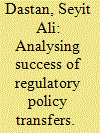

|
|
|
|
|
| Publication |
2011.
|
| Summary/Abstract |
Economic regulation of public utilities has become a worldwide phenomenon with the preceding privatisation stream. It is questionable to transfer regulatory models hastily without customising the policy options or introducing necessary institutional reforms enabling the achievement of expected results of regulatory reform. Institutional configuration of a country affects credibility of regulatory commitments, quality of regulatory design, and way of policy transfer. Turkey's energy market regulation experience confirms the decisive role of institutions in shaping the regulatory framework.
|
|
|
|
|
|
|
|
|
|
|
|
|
|
|
|
| 2 |
ID:
127572
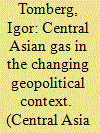

|
|
|
|
|
| Publication |
2012.
|
| Summary/Abstract |
The 21st century has confronted mankind with hitherto unknown dangers: the planet's natural resources, particularly energy supplies, have been depleting at a fast pace, which has stirred up fierce and mounting rivalry over hydrocarbons and other raw materials. In 2011, the growing instability in North Africa and the Middle East added fuel to the smoldering fire, increased the volatility of the energy markets, and cast doubts on continued and consistent fuel supplies from these and adjacent regions. Central Asia, in turn, is potentially threatened by the unwelcome developments around Afghanistan and Iran; ambitious investment projects (particularly in the energy sphere) are being jeopardized since investors are justifiably worried that a conflict with Iran might spread, in one form or another, to its Caspian neighbors.
|
|
|
|
|
|
|
|
|
|
|
|
|
|
|
|
| 3 |
ID:
180121


|
|
|
|
|
| Summary/Abstract |
We analyze a drastic price increase in the German auction market for reserve power that did not appear to be driven by increased costs. Studying the market structure and bidding strategies using micro-level bidding data, we find a concentrated market with highly pivotal suppliers in an environment with completely inelastic demand and high entry barriers. We provide descriptive evidence that the price increase was triggered by an abuse of the “guess the clearing price” principle of discriminatory auctions via repeated pretended “bad guessing” of the marginal bid by the most dominant supplier. As intentional “bad guessing” of marginal bids is hard to prove, this suggests that the auction design is crucial for the competition authority's monitoring power – an issue that is often neglected in the discussion on the properties of auction designs. In fact, given regulatory threats, the deemed main advantage of pay-as-bid auctions over uniform price auctions and the popular belief that they reduce dominant suppliers' withholding incentives and diminish their ability to tacitly collude may be questioned in non-static settings. This suggests that pay-as-bid auctions may not necessarily reduce incentives for strategic capacity withholding and collusive behavior, but can even increase them when market power is high and demand inelastic, which is the case in virtually all energy markets.
|
|
|
|
|
|
|
|
|
|
|
|
|
|
|
|
| 4 |
ID:
150341
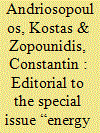

|
|
|
| 5 |
ID:
108764
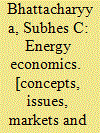

|
|
|
|
|
| Publication |
Verlag, Springer, 2011.
|
| Description |
xxvi, 721p.
|
| Standard Number |
9780857292674, hbk
|
|
|
|
|
|
|
|
|
|
|
|
Copies: C:1/I:0,R:0,Q:0
Circulation
| Accession# | Call# | Current Location | Status | Policy | Location |
| 056395 | 333.7/BHA 056395 | Main | On Shelf | General | |
|
|
|
|
| 6 |
ID:
091226


|
|
|
| 7 |
ID:
188803
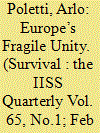

|
|
|
|
|
| Summary/Abstract |
The EU is unlikely to develop the kinds of efficient collective responses to the Russia–Ukraine war that it produced in reaction to the COVID-19 pandemic. The conditions of strategic interdependence generated by the Ukraine crisis are more demanding than those triggered by the pandemic because its consequences are asymmetrically distributed across member states. Germany will find it difficult to play the role of regional stabiliser, anti-Europe parties could become stronger, new intra-European cleavages may arise over collective goals, and the expansion of the crisis’s time horizon could weaken prospects for effective collective action.
|
|
|
|
|
|
|
|
|
|
|
|
|
|
|
|
| 8 |
ID:
111389


|
|
|
|
|
| Publication |
2012.
|
| Summary/Abstract |
In this research, we provide an overview of the climate-security nexus in the European energy sector, through a model based analysis of scenarios produced with the POLES model. The scenarios describe the consequences of different degrees of GHG emission constraint, at world level, but also for a case where Europe adopts an ambitious climate policy, while the rest of the world sticks to much more modest abatement policies. The analysis shows that under such stringent climate policies, Europe may benefit of a significant double dividend, first in its capacity to develop a new cleaner and climate-friendlier energy model, and second in a lower vulnerability to potential price or supply shocks on the international energy markets.
|
|
|
|
|
|
|
|
|
|
|
|
|
|
|
|
| 9 |
ID:
117263
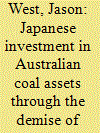

|
|
|
|
|
| Publication |
2013.
|
| Summary/Abstract |
The Australian coal industry has been described as being a perpetual case of 'profitless prosperity'. This implies that foreign companies invest in low-margin mining activities with motives other than profit. It is argued that foreign investors and Japanese trading companies in particular used government investment concessions and subsidies to help create oversupply in the seaborne coal market. The aim of this strategy is to depress contract prices at the cost of achieving reasonable profitability levels, which have historically been well below that of other investors in the Australian mining sector. This study shows that the quasi-integration via concessional funding arrangements is not a credible strategy employed by Japanese trading companies or the Japanese Government. The analysis rejects the hypothesis that via foreign direct investment, Japanese companies are securing coal at below average prices. Furthermore we find no clear evidence of Japanese trading companies using their information advantage as equity investors to secure coal at favourable prices during contract negotiations. Finally we examine the investment behaviour of new entrants in the Australian coal production sector to highlight the differences in investment strategy between Japanese companies and other foreign investors regarding the security of supply.
|
|
|
|
|
|
|
|
|
|
|
|
|
|
|
|
| 10 |
ID:
179687
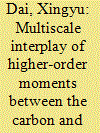

|
|
|
|
|
| Summary/Abstract |
The Phase III of the European Union Emission Trading System (EU ETS) is significantly different from the previous Phases in terms of price trajectory and operational mechanism. Against this background, this study reveals the multiscale interplay of higher-order moments (skewness and kurtosis) between the carbon and energy markets, and formulates optimal portfolio strategies to manage higher-order moments risks at different time horizons. We detect a breakpoint, September 15, 2016, in the carbon-energy markets which divides Phase III into two stages corresponding to different market status. Our findings show that the bidirectional higher-order moments spillovers between the carbon and energy markets are weak at the short-run timescales (below 16 trading days), while the long-run (over 16 trading days) higher-order spillover effect is greatly enhanced. In particular, we find the spillovers in the higher-order moments are strong when the carbon and energy markets are in bullish status. Furthermore, we demonstrate that carbon assets are good short-run hedge against exposure to spillover risks in higher-order moments of the energy markets, while the hedging effectiveness declines at the long-run timescales.
|
|
|
|
|
|
|
|
|
|
|
|
|
|
|
|
| 11 |
ID:
116415
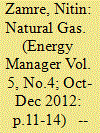

|
|
|
| 12 |
ID:
071451


|
|
|
| 13 |
ID:
176103
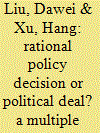

|
|
|
|
|
| Summary/Abstract |
After more than twenty years of waiting, the first gas pipeline connecting Russia and China—the Power of Siberia—began transporting gas in December 2019. Although much has been discussed concerning disputes over pricing and the route of this pipeline, the relevant events inside each nation, e.g. China's energy mix transition, its gas pricing reform, the reshuffle of Russia's natural gas industry, etc., that helped catalyze the deal have yet to be fleshed out. This paper analyzes the decision-making behind the deal using the multiple streams framework (MSF) which is well suited for the examination of decision-making under circumstances of ambiguity. Our analysis demonstrates the ambiguous policymaking circumstances for the gas deal and reveals how policy disputes over price and routing paralleled and interacted with the changing political landscapes and shifting problem agendas in both nations before they were coupled together by political leaders in 2014. The insights derived here are also helpful in analyzing other cross-border pipeline deals.
|
|
|
|
|
|
|
|
|
|
|
|
|
|
|
|
| 14 |
ID:
186368
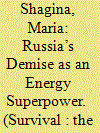

|
|
|
|
|
| Summary/Abstract |
Russia’s status as an energy superpower is waning. While Moscow is raking in short-term gains from record-high energy prices, it stands to bear long-term losses. Western sanctions, the European Union’s energy transition and Russia’s limited pivot to Asia will have profound implications for the country’s oil and gas industry. Since the Cold War, Russia’s energy sector has been tied to Europe. Moscow exported hydrocarbons to the West in exchange for Western capital and advanced technology. The war in Ukraine has forced Europe to wean itself off Russian fossil fuel and accelerate its energy transition. Russia’s energy decoupling from the EU will affect the structure of the state budget and alter the fabric of the Russian economy. The country’s pivot to Asia can only partially offset Europe’s decision to cut out Russian hydrocarbons. Furthermore, Moscow will become ever more reliant on Beijing, exacerbating their already asymmetrical relations.
|
|
|
|
|
|
|
|
|
|
|
|
|
|
|
|
| 15 |
ID:
183046


|
|
|
|
|
| Summary/Abstract |
This paper studies the effects of various economic and psychological factors on the switching behavior of large-scale electricity consumers in Turkey. Switching frequency and switching direction are two variables used to analyze switching behavior. The former is concerned with how often retailers change their suppliers. On the other hand, switching direction measures the direction of switching preferences of consumers between two electricity suppliers since the incumbent has a brand advantage over new suppliers that creates inertia and may reduce competition in the market. The target group of this study is large-scale electricity consumers rather than residential consumers since the switching activities of large-scale consumers are more competitive. We employ a five-point Likert scale questionnaire to construct eight psychological and economic factors to explain switching activities. The estimates indicate that improving service quality and providing essential services are the main motivations for switching decisions. Satisfaction with primary services, the homogeneity of the retail electricity market, and switching costs enhance the status quo; however, clarity of contracts and assistance for electricity distribution services (maintenance, metering, billing, etc.) affect the switching activities.
|
|
|
|
|
|
|
|
|
|
|
|
|
|
|
|
| 16 |
ID:
150347


|
|
|
|
|
| Summary/Abstract |
Long-run dynamics of electricity prices are expected to reflect fuel price developments, since fuels generally account for a large share in the cost of generation. As an integrated European market for electricity develops, wholesale electricity prices should be converging as a result of market coupling and increased interconnectivity. Electricity mixes are also changing, spurred by a drive to significantly increase the share of renewables. Consequently, the electricity wholesale price dynamics are evolving, and the fuel–electricity price nexus that has been described in the literature is likely to reflect this evolution. This study investigates associations between spot prices from the British, French and Nordpool markets with those in connected electricity markets and fuel input prices, from December 2005 to October 2013. In order to assess the time-varying dynamics of electricity spot price series, localized autocorrelation functions are used. Electricity spot prices in the three markets are found to have stationary and non-stationary periods. When a trend in spot prices is observed, it is likely to reflect the trend in fuel prices. Cointegration analysis is then used to assess co-movement between electricity spot prices and fuel inputs to generation. The results show that British electricity spot prices are associated with fuel prices and not with price developments in connected markets, while the opposite is observed in the French and Nordpool day-ahead markets.
|
|
|
|
|
|
|
|
|
|
|
|
|
|
|
|
| 17 |
ID:
099641
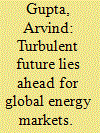

|
|
|
|
|
|
|
|